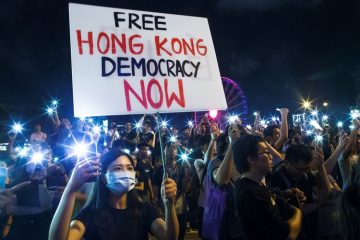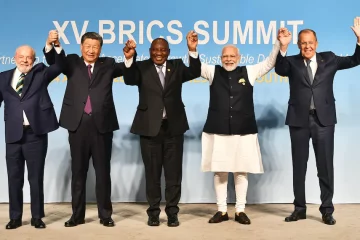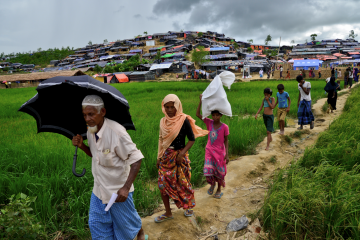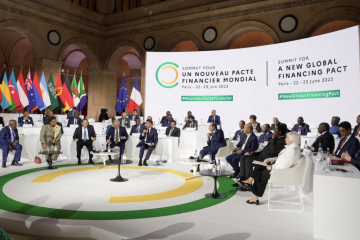
ISRAEL AND IRAN: WHAT NEXT?
With this month’s direct military strikes against each other, a war between Israel and Iran becomes not only conceivable but a growing risk. For all Israel’s advantages and determination, with the most sophisticated military in the region and an innovative and resilient economy, it is a small country of less than ten million people. Iran is a large country of over 80 million people whose economy and military capabilities have survived years of crippling sanctions. The outcome would depend on who had the strongest external support. For the time being, Israel has firm international friends and allies, as Iranian diplomats recognise. But that international support is under strain from the Israeli government’s refusal to consider any negotiations with the Palestinians …

OxPol Blogcast. Politics, Re-Imagined — Displacement and the World Economy with Alexander Betts
How can we ensure that displaced people live in safety and dignity and create a policy that is sustainable at the same time? In this episode, we speak to Dr. Alexander Betts, the Leopold Muller Professor of Forced Migration and International Affairs at the Refugee Studies Centre, and the Director of the Refugee Economies Programme, both at the University of Oxford. Alexander has written extensively on the political economy of refugee protection — highlighting how displaced people can access and contribute to economies worldwide. Politics, Re-Imagined is a series by the Department of Politics and International Relations (DPIR) at the University of Oxford focused on exploring tangible and sustainable solutions to the most pressing challenges facing humanity today. Listen on:

Chaos by Design: The Dehumanising Nature of US Aid Airdropped into Gaza
Since October 7, Israel has blocked most food, water, hygiene items, and medicine from entering Gaza. The government has denied access to aid agencies, security inspections have deliberately slowed the entry of trucks, communication blackouts have cut off internet and phone services to more than two million residents, and Israeli protesters have lined up to block humanitarian aid supplies. Moreover, the US, UK, and other donors suspended funding to UNRWA, the UN’s aid agency for Palestine, after Israel accused staff members of participating in the October 7 attacks and called for the organisation to be disbanded. Crucially, these accusations have not been proven. As a result, people in Gaza are starving. Sixteen children, and counting, have died of malnutrition, UN …

Israel’s Strategic Dilemma
Debate in Israel about the government’s strategy in the Gaza war is heating up. While a majority of Israelis still support the war in Gaza, a growing minority are questioning whether continuing the war against Hamas will bring greater security to Israel or stability to the region, arguing that the government’s military campaign will perpetuate a conflict damaging all parties – not least Israelis themselves. Benjamin Netanyahu’s failure to bring home the Israeli hostages has reinforced tensions and doubt among the public. But continuing the war suits the incumbent government, enabling them to remain in power. Paradoxically, it also suits Hamas. Only when a majority of Israelis themselves conclude that the current strategy puts at risk rather than guarantees their …

Can the Pro-Democracy Hong Kong Lobby Still Influence Western Foreign Policy?
During the 2019 Anti-Extradition Bill protests in Hong Kong, activists made extensive efforts to internationalize their movement, engaging in public diplomacy and lobbying foreign governments to support their cause. The Hong Kong pro-democracy lobby—a loose coalition of individuals and organizations aiming to steer Western foreign policy in a direction they believe will benefit Hong Kong’s democratic prospects—emerged amidst this unprecedented grassroots mobilization. Four years on, however, the Hong Kong lobby is facing an uncertain future. Activists are striving to overcome the barriers posed by transnational repression and reinvent their image in today’s fraught geopolitical landscape. Two factors explain the success of Hong Kong activists in constructing and consolidating their lobbying infrastructure in 2019. First, the expansion and transformation of the …

From BRICS to BRICS+: Implications for the Group, Multilateralism, and the Global South
Introduction After World War II, the multilateral system was designed to promote international peace, drive economic growth, and ensure global cooperation. Institutions such as the United Nations, International Monetary Fund, and World Trade Organisation established alliances, treaties, and agreements with the aim of achieving shared prosperity. In recent years, however, cracks are beginning to appear within this system. The world has witnessed a sharp increase in geopolitical crises like the Russia – Ukraine war, withdrawals from treaties, trade protectionism and back-sliding democracies. The multilateral system has also failed to deliver comprehensive solutions to global issues such as COVID-19 and climate change. As the inequalities within the multilateral system become increasingly apparent, calls for change are starting to reverberate across the …

Geopolitical challenges hamper Rohingya repatriation from Bangladesh
The Rohingya refugee crisis as a trigger for displacement For decades, the Rohingya, a predominantly Muslim ethnic group in Myanmar, have sought refuge in neighbouring Bangladesh to escape persecution. This influx, particularly since 2015, has strained Bangladesh’s limited resources. The persecution of the Rohingya is a textbook case of ethnic cleansing by Myanmar’s civilian-military government. With around one million Rohingya refugees in Bangladesh, concerns have been raised about the safety of the host population . Despite intense diplomatic efforts, Myanmar, governed by a military junta since 2021, remains reluctant to repatriate its Rohingya nationals, causing frustration in Bangladesh. Previous repatriation attempts in 2018 and 2019 failed due to the Rohingya refugees’ fear of violence upon return. In Rakhine State, where …

The Paris Climate Summit: A Milestone for the Global South?
International summits are vital to promoting global agreement and laying the groundwork for future international cooperation. The Summit for a New Global Financial Pact took place in Paris, co-hosted by France’s President Emmanuel Macron and Barbados’ Prime Minister Mia Mottley. The Summit, organised with the aim of promoting global unity for international financial architecture form, set out to achieve four main goals focusing on fiscal sustainability and climate change in low-income countries. Amid the worldwide increase in extreme poverty and climate disasters, these conferences provide a platform for building coalitions to resolve urgent humanitarian issues. However, there has been a marked decline in international cooperation and the success of these events. In 2022, the United Nations Climate Change Conference COP27 …






